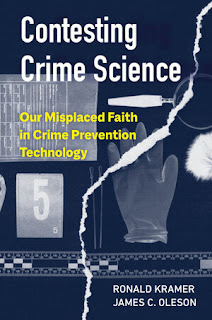 Culture, Crime and Punishment. James C. Oleson is Associate Professor in Criminology at the University of Auckland. His books include Criminal Genius: A Portrait of High-IQ Offenders and Fifty Years of Causes of Delinquency: The Criminology of Travis Hirschi.
Culture, Crime and Punishment. James C. Oleson is Associate Professor in Criminology at the University of Auckland. His books include Criminal Genius: A Portrait of High-IQ Offenders and Fifty Years of Causes of Delinquency: The Criminology of Travis Hirschi.
They applied the “Page 99 Test” to their new book, Contesting Crime Science: Our Misplaced Faith in Crime Prevention Technology, and reported the following:
Readers turning to page 99 of Contesting Crime Science will land at a subsection in the chapter on prediction in criminal justice. The section focuses on the relationship between techniques of prediction and sacrifice. Several scholars suggest that forecasting represents a mathematical abandonment of reforming individuals; others posit that punishment increasingly hybridizes prediction and reform. We suggest that prediction is underpinned by sacrifice: it is a way to “kill with impunity.”Learn more about Contesting Crime Science at the University of California Press website.
Readers would not get a complete idea of Contesting Crime Science on the basis of page 99. They would, however, get a fairly accurate impression of one of its central themes. Throughout the book, we focus on particular manifestations of crime science – biological forms of evidence, prediction, security technologies, and environmental design. We show how these branches of crime science are often antithetical to important legal principles, recast some everyday behaviors as deviant, and cannot control crime in the ways they typically promise. In some respects, crime science can be understood as reckless. When it comes to the freedom and wellbeing of some, especially those at the margins of society, crime science adopts a cavalier attitude. Page 99, or the theme of sacrifice, is ultimately a way to explore how the recklessness of crime science is manifest in prediction. We describe prediction as cavalier with the freedom of others for a number of reasons. Perhaps most obvious (although not necessarily common knowledge) forecasting future events is plagued by error. But even if prediction were perfectly accurate, it would still entail imposing or extending punishment on the basis of events that have not happened. In this sense, any action grounded by prediction amounts to a “leap of faith.” It is the story of Abraham and Isaac, minus the angel of God that intervenes to avert the tragedy.
The Page 99 Test: James C. Oleson's Criminal Genius: A Portrait of High-IQ Offenders.
--Marshal Zeringue



